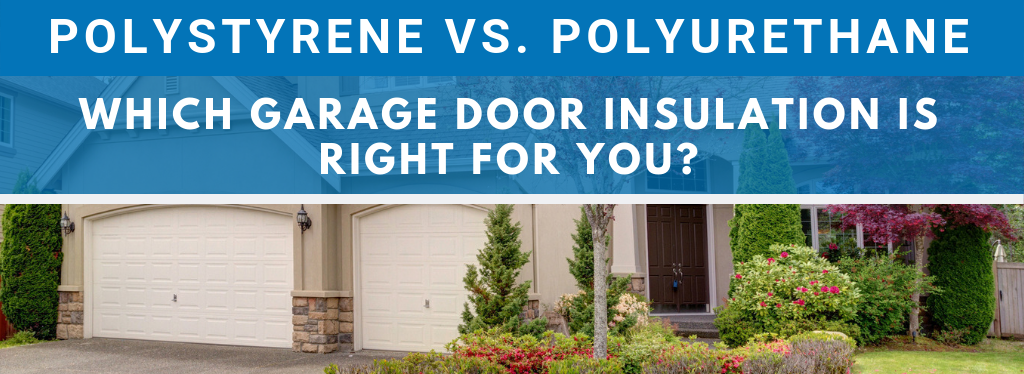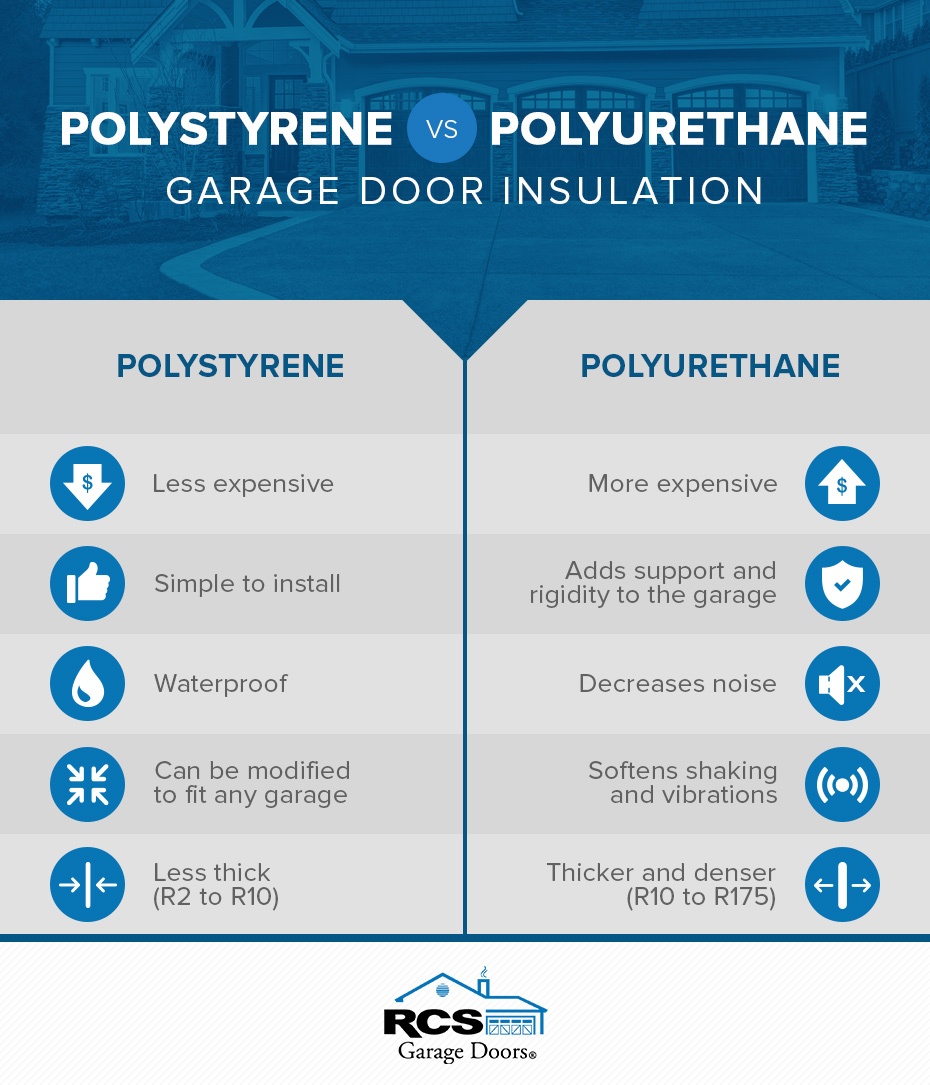Polystyrene vs. Polyurethane: Which Garage Door Insulation is Right for You?
Ever noticed how a garage feels like an oven in summer and like a freezer in winter? That’s why proper garage door insulation matters. Many people get stuck at the big question: polystyrene vs polyurethane insulation, which one should you choose?
Garage door insulation does more than control temperature. It can cut energy bills, protect items stored inside, and even reduce outside noise. But not all insulation works the same way. Each material has its own strengths and weaknesses.
Experts often say polyurethane is the best insulator because it fills every gap and blocks heat more effectively. Polyurethane has a higher R-value, which means better performance for comfort and savings.
Request a Quote for an Insulated Garage Door
What Is Polyurethane Garage Door Insulation?
Polyurethane insulation is a type of foam that is sprayed between the layers of a garage door. As it expands, it fills every small space, which makes the door stronger and better at keeping out heat or cold. Many homeowners like it because it improves comfort inside the garage.
Unlike some other materials, Urethane is denser and rigid, which means it offers better strength. This extra strength helps the garage door resist dents and damage. It also makes the door quieter when it opens and closes, which is an added benefit.
One of the biggest reasons people choose polyurethane is its efficiency. Polyurethane has a higher R-value, which means it can block heat transfer better than most options. It can save money on energy bills and keep the garage at a more stable temperature year-round.
However, there are some downsides. Polyurethane is a bit spongy, not ideal for homeowners who want a firm and completely solid feel. It also tends to be more expensive than other insulated garage doors. Still, if performance and strength matter most, polyurethane is often the top choice.
What Is Polystyrene Garage Door Insulation?
Polystyrene insulation usually comes in large, flat boards that are cut and placed inside the garage door panels. It does not expand to fill every space, but it still gives a decent level of insulation. Many homeowners use it because it is simple to install.
A major benefit of polystyrene is that it provides affordability and durability. Compared to polyurethane, it costs less. So it’s a good option for families on a budget. At the same time, it can last for many years without breaking down easily.
Polystyrene insulation also keeps the garage fairly comfortable. It won’t match polyurethane’s performance, but it still reduces heat, cold, and even some outside noise. For people who don’t use their garage as a living space, this level of insulation is often enough.
On the downside, polystyrene is less effective at sealing air gaps. It does not make the garage door as strong or as quiet as urethane foam. Still, if you want an option that is budget-friendly and reliable, polystyrene insulation is a solid pick.
Polystyrene Vs Polyurethane Garage Door: Choosing the Right Insulation
A well-insulated garage can save energy, protect stored items, and even increase your home value. The two most common choices are polystyrene vs polyurethane insulation. Both materials work, but they are very different in cost, performance, and durability.
Let’s look at the difference between polystyrene and polyurethane and see which one suits your needs. If you’re considering upgrading, check out our modern insulated garage doors that come with insulation options.
Thermal Insulation Performance
When it comes to keeping heat inside during winter and blocking it out during summer, insulation performance is key. Polystyrene is usually available in large sheets with R-values from R-3.5 to R-5. Its efficiency depends on thickness, but it doesn’t always seal every gap.
Polyurethane, on the other hand, expands to fill empty spaces. Polyurethane has a higher R-value, often ranging from R-10 to R-17.5. In fact, its thermal resistance ranges between R-6.0 to R-7.5 per inch, which makes it one of the strongest insulators.
If you want to winterize your garage door and use the space as a workshop or living area, polyurethane is often the better choice.
Noise Control Properties
Insulation isn’t just about temperature; it also affects sound. Polystyrene panels reduce some outside noise, but the effect is limited. You might still hear cars, wind, or neighborhood activity through the door.
Polyurethane performs much better in this area. Because it bonds tightly to the garage door panels, it reduces vibrations and sound. Many homeowners find that polyurethane creates a quieter garage door, especially when opening and closing. It makes it a great option if your garage is close to bedrooms or living areas.
Moisture Resistance
Polystyrene is naturally water-resistant, which means it does not absorb moisture easily. Also, it makes it a practical choice in areas like Charleston, SC, Wilmington, NC, or Myrtle Beach, SC, where humidity or rain is a concern. Its panels can be wiped clean and do not usually swell when exposed to damp conditions.
Polyurethane also resists moisture, but in a different way. Since it forms a dense foam inside the garage door layers, it prevents air leaks that can bring in dampness. It can help avoid problems like rust on the door or mildew buildup inside. Both materials offer good protection, but polyurethane tends to give stronger overall sealing.
Durability and Load-Bearing Capability
Polystyrene insulation provides affordability and durability. It can last for years without breaking down and is a good option if budget is your top concern. However, it doesn’t add much strength to the door itself.
Polyurethane is stronger because Urethane is denser and rigid. Once it fills the door panels, it makes the garage door more solid and less likely to dent. This extra strength helps the door handle withstand daily use and makes it feel sturdier. If durability and long-term performance matter most, polyurethane often wins in this area.
Material Composition & Density Differences
The biggest difference between polystyrene and polyurethane comes down to how they are made. Polystyrene is a lightweight foam, cut into boards and placed inside the garage door. It is firm but can feel less connected to the door structure.
Polyurethane is sprayed in as liquid foam that expands. It creates a bond with the metal door panels, adding strength and stability. While polyurethane is a bit spongy, it is not ideal for those who want a hard and solid feel. Its density makes it better at sealing gaps. This density is the main reason polyurethane is the best insulator.
Which One Should You Choose?
So, which insulation fits your goals? If you want a low-cost option that still keeps the garage comfortable, polystyrene is a solid pick. It is budget-friendly, moisture-resistant, and simple to install.
If you want better performance in every area, temperature control, sound reduction, and door strength, polyurethane is the clear winner. It may cost more, but it saves money in the long run by lowering energy bills and adding strength to your garage door.
By considering your budget, goals, and space needs, you can decide which material works best. Both can make your garage more comfortable and increase your home value. But finally, your choice depends on what matters most to you.
Polystyrene vs. Polyurethane: Which Is More Affordable in Monroe, NC?
When comparing polystyrene vs polyurethane insulation in areas like Fowler Secrest Rd, Monroe, cost is one of the first things homeowners notice. While both improve comfort and energy savings, the price difference is significant.
Polystyrene is often seen as the budget-friendly option. It comes in large sheets or panels that are cut to fit the garage door. Because the material is lightweight and easy to produce, the cost is lower.
On average, polystyrene insulation for a garage door may range from $0.30 to $0.50 per square foot. For a standard two-car garage door, the total cost may fall between $150 and $250, depending on thickness and quality.
Polyurethane, on the other hand, is more expensive. The material is sprayed in liquid form and expands inside the door panels. This way makes the process more complex. However, it also creates a tighter seal and a stronger door.
This type of quality comes at a higher price, often ranging from $1.00 to $1.50 per square foot. For the same two-car garage door, polyurethane insulation may cost around $400 to $700.
While polyurethane is pricier upfront, it often pays off through lower energy bills and added door strength. Polystyrene is cheaper and still effective for basic needs. The best choice depends on whether you value upfront savings or long-term performance.
Polyiso vs Polyurethane vs Polystyrene: Garage Door Insulation in Charlotte, NC
Choosing the right garage door insulation in Charlotte, NC, can feel confusing because there are multiple materials with different benefits. The three most common are polyiso, polyurethane, and polystyrene, each offering unique advantages.
Thermal Performance
Polyiso foam boards provide excellent resistance to heat, with R-values around R-5 to R-6.5 per inch. Polyurethane performs even better, with R-values ranging between R-6.0 to R-7.5 per inch, making it one of the strongest insulators. Polystyrene has lower efficiency, usually R-3 to R-5, but it still helps regulate garage temperature at an affordable cost.
Strength and Durability
Polyiso is rigid and lightweight, but does not bond tightly to garage doors. Urethane is denser and rigid, meaning polyurethane adds strength and reduces dents and vibration. Polystyrene provides affordability and durability, but doesn’t reinforce the door as much as polyurethane.
Cost Comparison
Polystyrene is the most affordable option, costing about $0.30 – $0.50 per square foot. Polyiso comes next, at about $0.50 to $0.90 per square foot, offering a middle ground. Polyurethane is the most expensive at $1.00 to $1.50 per square foot. But it provides the best energy savings over time.
| Material | R-Value per Inch | Durability | Noise Control | Cost (per sq. ft.) |
|---|---|---|---|---|
| Polystyrene | R-3 to R-5 | Moderate | Basic reduction | $0.30 – $0.50 |
| Polyiso | ~R-6 | Good, lightweight | Moderate | $0.50 – $0.90 |
| Polyurethane | R-6 to R-7.5 | Strong & rigid | Excellent (quiet) | $1.00 – $1.50 |
Which Is The Right Garage Door Insulation System for North Carolina Residents?
For homeowners in North Carolina, the right insulation depends on your goals and budget. If you want the most affordable choice that still improves comfort, polystyrene works well. It is easy to install and offers decent energy savings for families who just want to reduce costs.
If you are looking for strong performance in all areas, like temperature control, strength, and a quieter garage door, then polyurethane is the best choice. Polyurethane provides higher-quality insulation and it has a higher R-value, which means better insulation, and it also makes the door more durable.
For areas with hot summers and cool winters, polyurethane provides year-round benefits. Polyiso falls in the middle, as it offers good efficiency at a moderate cost.
No matter which material you choose, proper installation matters most. That’s why many residents trust RCS Garage Doors in North Carolina. We provide reliable guidance, quality products, and professional services with more than 30 years of industry experience. Thus, we can help you pick the best system for your home.
Learn More About Insulated Garage Doors
Whether you want to winterize your garage door or simply save on energy bills, RCS Garage Doors is a trusted local option for North Carolina and the surrounding areas.


 Register My Door
Register My Door

